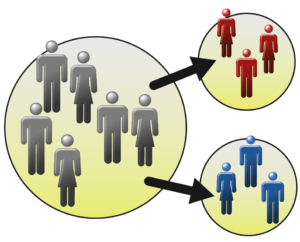We all want the best possible treatment for our family and ourselves. When a “new” medication is mentioned in the newspaper, or on the TV, we take interest, especially if someone we love is currently living with cancer. More generally we all hope that better treatment options might be available to us should the need ever arise. One question that people often ask is “why can’t I just take the new treatment?”
 What treatment is offered in a clinical trial depends on the phase of the clinical trial, and the design of the trial. In phase 1 and some phase 2 trials, the new treatment is usually the only one given. In some phase 2 trials and almost all phase 3 trials, you might be “randomised” to take either the standard treatment or the new treatment.
What treatment is offered in a clinical trial depends on the phase of the clinical trial, and the design of the trial. In phase 1 and some phase 2 trials, the new treatment is usually the only one given. In some phase 2 trials and almost all phase 3 trials, you might be “randomised” to take either the standard treatment or the new treatment.
Why do clinical trials randomise treatments?
“Randomised” means that once you choose to take part in the trial, and the team caring for you has checked that you fit all the criteria required for the trial, neither you nor your doctor has a choice of what treatment you take. While not as crude as flipping a coin, a computer randomly assigns patients to the different treatments being tested.
This can be very frustrating, as people hope that they will get the new medication rather than the standard, but sometimes only half of patients will “win” this bet. This has been particularly challenging as the immuno-oncology drugs offer a treatment with a completely different mode of action to standard treatments like chemotherapy and targeted therapies, and the very real hope is that even if these standard treatments have failed, then immuno-oncology drugs might succeed.
Will I get the new treatment either way? (Is there cross-over?)
Some well-designed trials allow patients to “cross-over” to the new treatment from the standard treatment if/when it fails. This allows the drug to be well tested, but also offers every patient the opportunity to benefit from the novel therapy.
If the trial does not allow cross-over, and you could take the standard treatment elsewhere, then there are still good reasons to stay on the trial. First and foremost your participation will serve to prove the benefit (or not) of the new treatment versus the standard treatment. Every treatment we have ever been able to prove works for patients has needed brave and generous people to remain on trials.
What if I don’t receive the newer treatment?
More importantly however, while the quality of care provided by your doctor will be the highest they can deliver within your health care system, patients on clinical trials routinely experience an even higher quality of care than patients not on clinical trials. This is likely because they have the doctors and nurses watching them so closely, that problems get discovered and addressed even faster than in people not on clinical trials.
